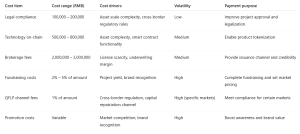Professor Coin: What’s Driving Cryptocurrency Adoption Around the World
5 months ago CryptoExpert
Professor Andrew Urquhart is Professor of Finance and Financial Technology and Head of the Department of Finance at Birmingham Business School (BBS).
This is the fifth instalment of the Professor Coin column, in which I bring important insights from published academic literature on cryptocurrencies to the Decrypt readership. In this article, we’ll investigate cryptocurrency adoption.
Cryptocurrencies are clearly growing in terms of size, scale and types of offerings, which altogether indicates the growing importance and influence they have on the traditional financial system.
They may have begun life being traded by only a select few computer programmers, but since the introduction of Bitcoin futures in 2017 and the subsequent introduction of other derivative products, culminating in the Bitcoin spot ETF launch in January 2024, more investors are taking notice of this innovative asset class.
At the core of the fourth industrial revolution is artificial intelligence, information communication and technology, the internet of things and blockchains—and PwC predicts that blockchains will boost global GDP by $1.76 trillion by 2030.
China places blockchain as one of its top five priorities, while other countries, including Germany, Japan, the UK and France, all see the potential benefits of over $50 billion. The increased investor interest in recent times may have changed the user base forever, and this adoption may differ across industries, territories, regulatory domains and political realms. In this column, I investigate what is driving cryptocurrency adoption across the globe.
Some recent work examines the relationship between certain macro-national developmental indicators and cryptocurrency deployment across 137 countries, and interestingly finds that the countries with higher education, human development, democracy, regulatory quality and gross domestic product (GDP) have higher adoption of cryptocurrencies.
However, countries with less economic freedom and more corruption have experienced less adoption, indicating that more open and free nation states have experienced adoption. This suggests that it isn’t corrupt, uneducated states that are adopting cryptocurrencies, but more open, democratic and free states.
Trust, but verify
Now that we know the economic and state variables affect adoption across different territories, but what about trust? Trust is a social construct and a belief, which fosters economic growth, financial development and financial inclusion.
Trust has fallen in recent decades—and as European Central Bank President Christine Lagarde remarked, “In this age of diminished trust, it is the financial sector that takes last place in opinion surveys.”
Work by Jalan et al (2023) supports the work by Bhimani et al (2022) in showing that countries with higher trust levels have a higher interest in, and adoption of, cryptocurrencies, confirming the importance of trust in the growth of financial markets.
In a more detailed study, Saeedi and Al-Fattal (2025) explore which aspects of trust are important for cryptocurrency adoption and they find that females place more weight on regulation trust than males, while social trust is more important for older participants.
DeFi adoption
What about the distinction between the adoption of cryptocurrencies and decentralized finance (DeFi)? Recent work by Nguyen and Nguyen (2024) suggests that high cryptocurrency adoption can arise from the combination of high population, high inflation, low social connectedness, democracy, and uncertainty avoidance, while high human development, high population, and high financial development seems to be the dominant configurations in explaining a country’s DeFi adoption.
But what impact does adoption, and different types of adoption, have on cryptocurrencies? Recent work by Rzayev et al (2025) document that early adopters of cryptocurrencies drive cryptocurrency returns and improve price efficiency, while late adopters contribute to noisier prices and efficiencies. Therefore, early adopters are key drivers for any cryptocurrencies.
Therefore, the academic literature suggests that adoption of cryptocurrencies varies widely across the world, but there are key economic and state indicators that explain adoption. Further, the type of adoption affects the performance of cryptocurrencies, indicating that not all attention is created equally.
For more information, see:
Bhimani, A., Hausken, K., Arif, S. (2022). Do national development factors affect cryptocurrency adoption? Technological Forecasting and Social Change, 181, 121739.
Jalan, A., Matkovskyy, R., Urquhart, A., Yarovaya, L. (2023). The role of interpersonal trust in cryptocurrency adoption. Journal of International Financial Markets, Institutions and Money, 83, 101715.
Nguyen, L. T. M., Nguyen, P. T. (2024). Determinants of cryptocurrency and decentralized finance adoption – A configurational exploration. Technological Forecasting and Social Chance, 201, 123244.
Rzayev, K., Sakkas, A., Urquhart, A. (2025). An adoption model of cryptocurrencies. European Journal of Operational Research, 323, 253-266.
Saeedi, A., Al-Fattal, A. (2025). Examining trust in cryptocurrency investment: Insights form the structural equation modelling. Technological Forecasting and Social Change, 210, 123882.
Daily Debrief Newsletter
Start every day with the top news stories right now, plus original features, a podcast, videos and more.













